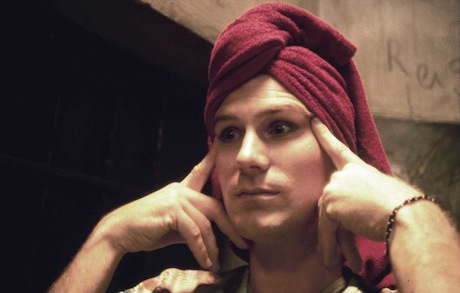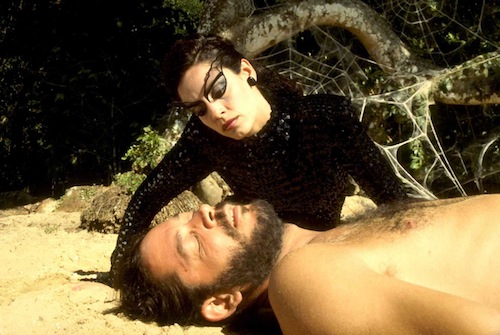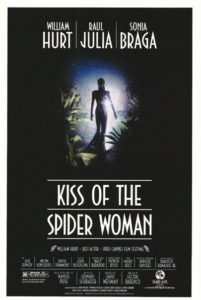Welcome back to 80s Bits, the weekly column in which we explore the best and worst of the Decade of Shame. With guest writers, hidden gems and more, it’s truly, truly, truly outrageous.
[stextbox id=”grey” caption=”Kiss of the Spider Woman (1985)” float=”true” align=”right” width=”200″]
Director: Héctor Babenco
Writers(s): Leonard Schrader
Runtime: 120 minutes
Starring: William Hurt, Raúl Juliá, Sonia Braga
Distributor: Island Alive
Rating: Better Than Average Bear (?)

The history behind Kiss of the Spider Woman is almost as fascinating as the story on screen. Argentinean writer Manuel Puig wrote the novel in the mid-1970s, but found that El beso de la mujer araña could only be published in Spain. Banned in Argentina until 1983, the book is a stream of consciousness piece that is written almost entirely in dialogue and deals with psychological issues of sexual repression and politics. Since that time, it has been adapted into a stage production, this film and bizarrely, a Broadway musical. Leonard Schrader, brother of Paul Schrader, adapted this for the screen for Argentine-born Brazilian film director, Héctor Babenco.
The film concerns two men, the flamboyantly gay Luis Molina (William Hurt) and political activist Valentin Arregui (Raúl Juliá) sharing a prison cell in an unnamed South American dictatorship. Molina chooses to escape the boundaries of the prison by recounting the plot of a melodramatic German propaganda film he saw years ago, initially to the annoyance of Arregui. However, Arregui is soon pulled in by the telling of the tale, despite his steadfast vow to remain an unwavering political prisoner. Yet as the two slowly grow closer, it becomes clear that each is having a profound impact on the other’s philosophy and hidden agendas come to light.
How does one begin to discuss Kiss of the Spider Woman? Indeed, how does one begin to describe it? On the surface it is a film within a film, recounted by one character to another. It is a story about two prisoners trying to escape the walls through conversation, and the enduring power of imagination. Such an analysis is merely a superficial one, but the focus of the film on the conversations – as well as the film’s refusal to commit to a South American location or the politics of the land – keeps that focus on the politics and dreams of these two individuals. Except for the odd flashback and random scene elsewhere in the prison, we have no concept of what is really happening outside the four walls of their prison cell. Molina and Arregui’s cell seems almost deliberately blacked out to everyone else, with even their bars covered over with plating. The few glimpses we get of the rest of the prison show that this is not the case for everyone on the inside, and serves as a way for us to maintain a distraction-free spotlight on these two characters. It is a film about power, both sexual and political.
Kiss of the Spider Woman is a very dialogue-driven film, and one issue with this kind of film is that it has a tendency of feeling stagey. Kiss of the Spider Woman avoids this in some ways with the film within the film, giving the audience the same escape route out of the confines of the prison. These segments, often shot in beautiful sepia, lift us beyond the prison walls and convey a sense of the ideological views of both prisoners. Yet this is ultimately a two-hander of a stage piece, as the men talk out their issues. Each helps the other survive, and one ultimately gives the other freedom of a kind. William Hurt’s Oscar-winning performance, providing much of the narrative, holds our attention for the lengthy running time. Trivia lovers will know this role was made possible after Burt Lancaster dropped out of the production due to ill health and ideological conflicts with the filmmakers.

Somewhat dated by today’s standards, especially given that (homo)sexual politics has been dealt with more directly on screen since, but a film with a gay man and a Marxist as heroes would have been close to revolutionary in 1980s America, especially when compared to cinema’s attitude only a few years before. Indeed, as Vito Russo (1987) points out in the seminal The Celluloid Closet, “[In the 1970s] American cinema was unable to portray gay characters without their being sex-obsessed or sex-defined”. It serves as something of a historical milestone as well, being the first independent feature to be nominated for Best Picture at the Academy Awards. At the time, independent films didn’t exist to the same extent they do today, where the likes of Miramax and Fox Searchlight have almost given indie films their own studio system.
The impact of Kiss of the Spider Woman may not be as large as it was in 1985, when the spectre of AIDS and death by the communists loomed large in the American psyche. Although neither speaking directly to either the epidemic or the Cold War, the success of the film in this climate is a testament to the boldness of its vision. Although somewhat stagey, it is also an example of true independent filmmaking at a time when it was actually a big deal for an indie film to gross any money let alone be nominated for Best Picture at the Oscars. Anchored by excellent performances, Kiss of the Spider Woman remains much more than just a historical curiosity.
Kiss of the Spider Woman is an ambitious attempt at adapting a complex novel. While it may not capture that complexity on screen, the strong performances and intriguing narrative continues to fascinate.





